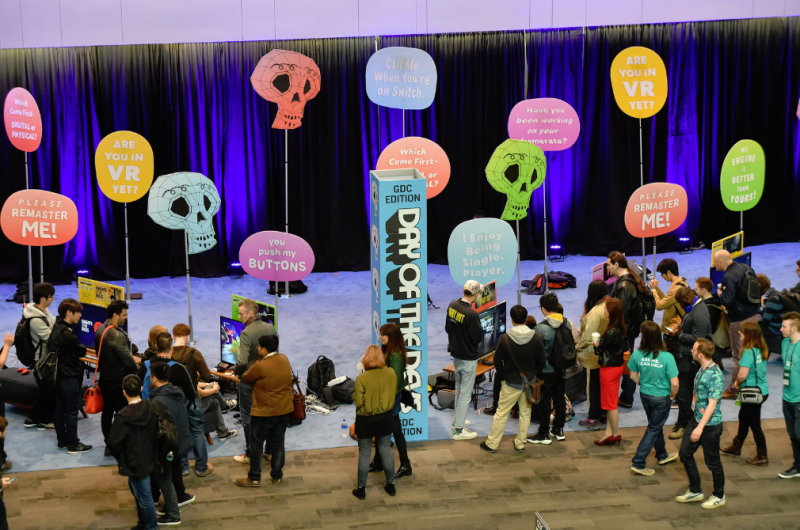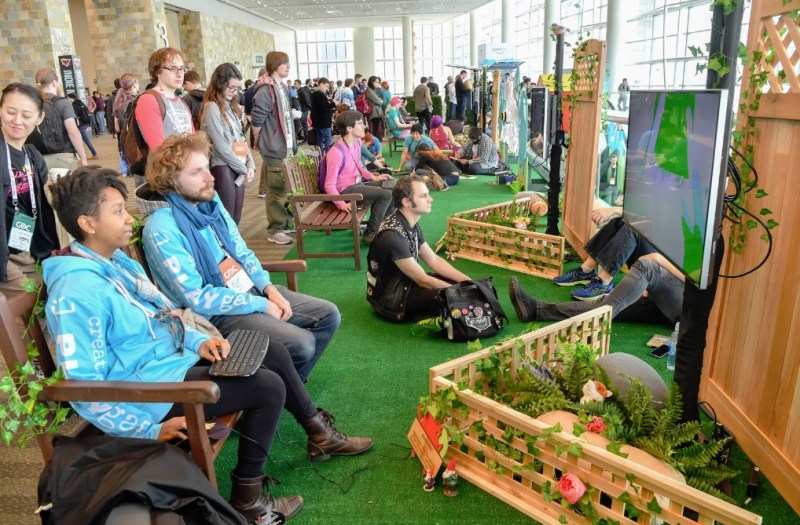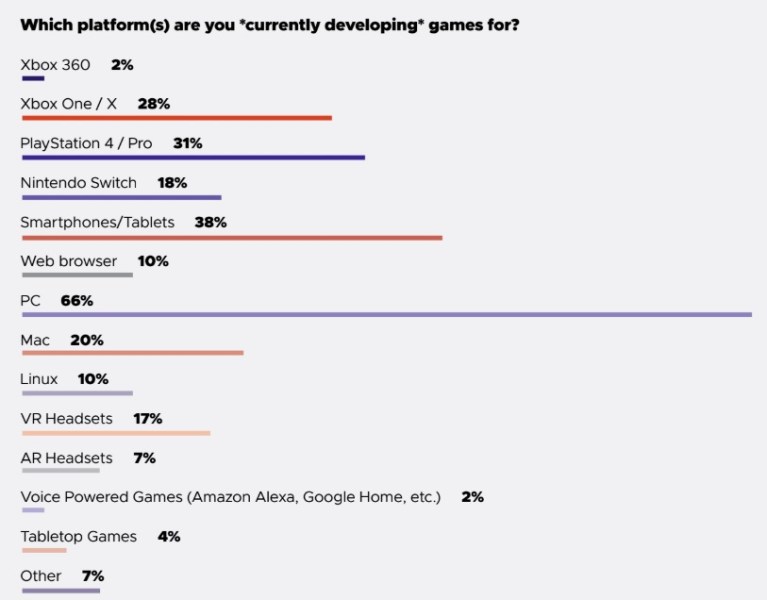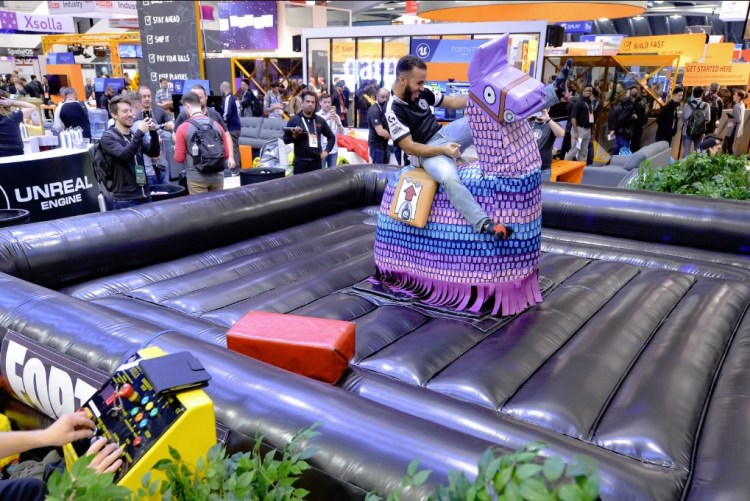Katie Stern took over as general manager of GDC Events in August 2017. Since then, she has learned more about what keeps game developers up at night.
We talked to Stern last week as final preparations were underway for the Game Developers Conference 2019, which starts on Monday, March 18 and runs through Friday, March 22. The event will draw well over 20,000 people to San Francisco, if all goes as expected, Stern told us in an interview.
A recent survey of 4,000 developers released in January showed that nearly half of them support unionization, a majority no longer believe Steam justifies its 30-percent revenue cut of PC game sales, and that nearly half of game makers have spent working overtime hours in “crunch mode.” Stern said she expects that these issues will be a big part of the conversation at GDC 2019, which will feature more than 400 sessions in the newly remodeled Moscone Convention Center in San Francisco.
About 2 percent of developers said they were working on their next games exclusively for an unannounced game platform. That number, about 100 developers, suggests that plans are underway for next-generation consoles, from Google’s Project Stream to Microsoft’s next gaming machine. If I were among those who don’t know about the existence of such projects, I’d be a little concerned that I’m missing out.
June 5th: The AI Audit in NYC
Join us next week in NYC to engage with top executive leaders, delving into strategies for auditing AI models to ensure fairness, optimal performance, and ethical compliance across diverse organizations. Secure your attendance for this exclusive invite-only event.
GDC is the place where you find out about things like the next big platforms. Google has said it will talk about its plans on Tuesday, March 19, while Epic Games will show off its latest Unreal Engine platform news on Wednesday, March 20. Amazon will hold its own keynote on March 18. These types of sessions are increasingly common at GDC, which has become the place to go to capture the attention of game developers.
Stern said she expect issues such as accessibility, as reflected in Microsoft’s Xbox Adaptive Controller for gamers with limited mobility, will be a hot topic at this year’s GDC. She also thinks alternative app stores, machine learning, and crunch will also be part of the discussions. Meanwhile, to make GDC seem less intimidating to newcomers, Stern said the conference has extended programs such as mentorship, expanded a relaxing area known as the GDC@The Gardens, added new community spaces, and launched its GDC Cares charitable drives.
Here’s an edited transcript of our interview.

Above: Katie Stern is general manager of GDC Events.
GamesBeat: It looks like we’ll have a good GDC this year, without a ton of construction going on this time.
Katie Stern: Yeah, we’re excited. It’s finally all finished. The space is beautiful and the weather is supposed to be great, so it should be a complete 180 over last year. [laughs]
GamesBeat: Did you wind up with a lot more space this year?
Stern: It ended up being a slightly larger amount of space than we’re used to, but we filled it with content very quickly. The biggest difference people will notice is that the space is just lighter and brighter and more modern. We were able to connect the expo floors, because it’s all now one continuous space that was built out underneath the streets. The north hall and the south hall are connected by a kind of central hall. It’s not a lot more room, but it will feel much nicer.
GamesBeat: Are we looking at the same number of people in general, 25,000 or so?
Stern: We’re tracking pretty similar to our numbers from last year, which was about 20,000 or so. We won’t know the final numbers until after the event, or at least the final day. But it’s shaping up to be similar to the size and scale of last year.
GamesBeat: I got the survey, and I was curious what you think some of the big topics will be at GDC, whether that relates to the survey or some other things you think will be popular.
Stern: We’re trying to spend a lot of time this year thinking about the idea of what keeps people up at night. We’re curating some themes around that to help people address some of the challenges they face in their everyday workflow. One of those is discoverability. How do you rise above the noise and get noticed? We’ve scheduled quite a bit of content around that, a full day dedicated to it specifically. We also notice that there are big trends in better accessibility of game design and access to games. We’ll have the people at Microsoft who designed the Xbox adaptive controller coming through. They’ll be talking about how they made the controller, as well as better ways to create accessible design in games.

Above: GDC 2018
More along the lines of the personal level of things, unionization has continued to grow as a hot topic. We’ve seen that build out of roundtable last year. We have a couple more sessions dedicated to that conversation, having a platform for people to discuss whether it makes sense for our industry. At GDC we try not to take a specific view, but have an opportunity for people to have open-ended discussions around it. We have a panel, a roundtable. We’ve put some emphasis on that for people to continue the dialogue.
GamesBeat: That was a big topic in the survey. It seemed like more people are in favor of it than have been in the past.
Stern: We’re definitely noticing that as the trend. As people deal with things like studio closures this year, that’s resulted in a lot of discussions around crunch, how studios work, how studios take care of their employees, how that’s being messaged. It’s brought up that conversation a bit more than in the past.
GamesBeat: I was surprised to see Steam becoming a bigger concern for developers. Was that surprising at all, to see that people are interested in alternative stores, like the Epic Games store and other things?
Stern: It’s not entirely surprising. Again, I think it comes to discoverability. Everyone is looking for ways to get their games in front of people and see better sales. As they look at the existing platforms, it’s a crowded space. They all have their pluses and minuses and challenges in how they distribute content. People are looking for ways to better the results from the work they put in. You’ll see that in some of the sessions we have on site, talking about the state of those stores specifically. It’s definitely a top-of-mind conversation, where some people are looking at the idea of going into the store space while others are stepping out of it. You’ll see some interesting moves in that space this year.
GamesBeat: I noticed on the schedule that there are a couple of things related to blockchain. Did you ask about that in the survey, whether blockchain in gaming was something that’s getting attention?
Stern: I don’t believe we asked specifically about blockchain, but I’ll go back and double check that. From a content perspective, we recognize that it’s a new trend, but it hasn’t quite matured in a way that makes sense for GDC content in our editorial section. A lot of it is sponsored content. We think it’s meaningful to have that at the show, and we wanted to make sure it was discussed and talked about, but we’re still trying to identify what it’s going to look like within games. Right now there are many ways to achieve what blockchain is trying to achieve without actually using blockchain, so what is its real benefit for developers?
We’re still in the infancy of that space, and it’ll be interesting to see where it goes over the next couple of years. We saw a bit last year, and you’ll definitely see more discussions and more hype around it this year.

Above: Watching demos at GDC 2018.
GamesBeat: Machine learning has been trending for a few years now. Do you notice anything different about the sessions or interest in that topic?
Stern: That’s one of the other hot topics we’ve identified as well. We’re seeing a more mature approach to talking about machine learning now, as it’s starting to get a bit more into the discussion around AI and how it makes sense to utilize and what that means for game developers. We have Yves Jacquier from Ubisoft Montreal coming with a great session about alchemy and science in machine learning for games. He takes a very scientific approach to the topic, and he has some really interesting insights.
The other one I thought was interesting is using machine learning to help fight disruptive behavior. We have Jarrod Doherty from Blizzard coming to talk about how they’re using machine learning solutions to quantify and fight that kind of behavior. We’re seeing it leveraged in different ways, and we’ll have more discussions about how to leverage machine learning applications in a broader sense.
GamesBeat: I like the question about the rumored consoles and which developers are making games for these unannounced platforms. It’s a nice tea leaf to suggest that things are coming, but not announced yet. If you’re one of the developers who doesn’t know what’s going on, you might be a little worried about this.
Stern: It’s always one of my favorite fields, because it’s interesting to see who’s working on these secret upcoming things. We’ve seen the rise of all kinds of platforms over the years, so it’s only natural that we’re due for another generation of what that might look like. People are leaning more toward streaming and cloud, so what does that look like? Over the next couple of years, I wouldn’t surprised if that’s where it’s leading. That’s what we’re teasing out with that type of question.
GamesBeat: If that were a very large percentage, we’d probably see more leaks of what’s coming, but only two percent of people say they’re working exclusively on something.
Stern: It’s in its infancy, yeah.
GamesBeat: You’ve also worked a lot on initiatives like mentorship and the gardens and community spaces. Is there a particular goal you’re driving at with those programs?
Stern: We recognize that GDC has grown into a pretty large event. Our focus this year was on bringing it back to helping enable people to find their cohorts, the people that are like themselves, for spontaneous and serendipitous networking opportunities. We’re trying to find opportunities within the broader show to bring them back together to find more commonalities.
With the gardens, we recognize that was already a place where people coalesced, and we don’t want to mess with that. We just thought we’d add some additional amenities so they can still take advantage of the space. We created some more specific themed community spaces on the expo floor for people to have a place to set up meetings or take a break and meet up with each other. We focused this year on a few specific communities as a pilot program that are pretty obvious, smaller groups: the game audio community, the narrative writers community, and the visual artist community. We have dedicated spaces there with a lot of great content and some interesting installations and live functions happening throughout to spice up the space.
We also introduced the main space as a way to celebrate developer stories, to celebrate the community together in one large setting. It’s a way to see, all together, that one exciting, inspirational message, and then go out and find your people and make GDC your own.
GamesBeat: Is the GDC Cares initiative something brand new?
Stern: It is, yeah. We’re kicking that off this year with a really simple sock drive. It provides socks to one of the local non-profit organizations that supports homeless and at-risk families. It’s a simple, immediate return on people’s investment. We’re kicking it off with a donation of about 500, initially, for men and women. We’re trying to make sure we’re doing our part in giving back to the community that lends itself to us while we’re here. We also partner every year with Indie Giving, and they’re supporting a couple of organizations this year that also support the homeless. It’s one of the topics that our community is very passionate about.

Above: Virtual reality demo at GDC 2018.
GamesBeat: Looking at the makeup of GDC, do you know how many people are students or young professionals, the targets for the mentorship program?
Stern: We’re looking at the mentorship program as something more broad than just addressing students. We have very dedicated student content on Friday, but we want to enable developers at any stage in their career to access support so they can continue to stay within their careers. That can be anything from how to manage a team to how to manage your career, portfolio reviews, interview skills, whatever it is that you feel you need a little extra oomph behind to be successful and stay in the industry.
We see so much turnover in the indie side of the space, and in the triple-A side of things as well. If your studio closes and you need to reinvent yourself and find a new path, how do you do that? We wanted to provide an opportunity for more formalized collections and allow people to access more veterans to have more real conversations. It’s harder to do that in the kind of hallway conversations that you have in passing. We’re excited about launching that this year.
GamesBeat: How is the representation from overseas? Have you heard any stories about people getting their visas or not this year?
Stern: Our representation is still pretty strong, all things considered. We’re still about 30 percent international attendees, which is larger than most conference averages in the U.S. I haven’t heard any specific feedback around approvals or denials of visas this year, any more than in any other year. Obviously we do our best to help provide application letters for folks so we can do our part in helping people get the travel documents they need, but unfortunately there’s only so much we can do as a conference organizer.

Above: The GDC survey results on the most popular game platforms for developers.
GamesBeat: Women’s issues were a big topic in the game industry last year. Do you see that reflected in GDC in particular ways?
Stern: I haven’t checked our diversity breakdown this year in our registration. We won’t have a better idea of that impact until after the show. But we always strive to make sure we’re creating an environment that feels safe and welcoming for people, and that we’re scheduling a larger than average percentage of women in our conference programs.
We partner a lot with community organizations to enable women and other underrepresented segments of the market to attend the event if they didn’t have the means or the support from the organizations they work for to otherwise attend. We obviously partner with the AIAS Amplifying New Voices program to help provide media and other training to women so we can empower them to grow their careers. The IGDA also launched a speaker diversity initiative this year, which we help support and promote. We do what we can from an organizational perspective to help create an environment that’s supportive and welcoming and fostering that segment of the market.
GamesBeat: The results from the survey on developers working more than 40 hours a week, was there anything interesting in that?
Stern: We noticed that people’s self-reported numbers were different in the survey than what we hear when people talk about them elsewhere in the space. We were surprised by how those numbers played out this year. They didn’t necessarily match what we thought they would before we did the survey.
GamesBeat: Do you think anything is going to stand out from the awards show?
Stern: We’re really excited about our two special awards this year, for lifetime achievement and pioneer. It’s exciting to see two women at one time on the stage. It’s obviously not the first time we’ve awarded those, but it’s great to see that representation and recognition. Our award winners are a great, diverse group of folks. It’ll be exciting to watch the announcement of all of those. It’s going to be a good year.

Above: A small percentage of game developers are working on next-gen projects.
GamesBeat: I’m always interested in some of the postmortems on retro games. Command & Conquer is coming up. Those are pretty popular and well-attended.
Stern: Definitely. We’re excited to have a nice lineup of post-mortems this year. Mike Dailly, with Lemmings, he’s so excited. He’s like a one-man hype show for GDC right now, which is a lot of fun. We also have Paperboy, which is another one people have fond memories of playing when they were younger. I think we have four or five this year. It’s fun to get one of the older Spider-Man games in there, talking about that juxtaposed with all the brand new Spider-Man content coming out. That’s fun, to be able to do both the old and the new in the same show.
GamesBeat: We’re seeing more announcements at GDC nowadays. In the past, you’d have keynote speeches, and we had things like the original Xbox announcement. Now we have company-sponsored events from Amazon and Google and Epic and the like, and those are getting interesting as far as producing a fair amount of news. What do you notice about that trend?
Stern: We saw a bit of that creeping in last year, and we’re seeing it in full force this year. It’s exciting that they think of GDC as a place where they want to get their message out – that we have the right audience for them, and it’s where they want to make their big splash. We’ve heard from a few folks that they use GDC strategically as a launch site for new campaigns for whatever they’re announcing.
As we see more and more of these big players have their own user conferences and things along those lines, they’re used to having their own crafted, curated experiences to create these kinds of messages. It made more sense for us as a show to allow them a platform to do that in their own way. That’s why we don’t do the keynotes and product announcements. As part of the show content, they can be considerably more meaningful. We can allow them the opportunity and space to do it in a way that’s unique to their brand and their voice and how it fits within the broader GDC context.
Some people are excited about those announcements, and some people are coming just to learn and they don’t care. We wanted to provide that balance for everyone. I wouldn’t be surprised if we continue to see this path a bit more in the next couple of years, as new announcements are occurring. It’s an interesting shift in how people approach their big announcements.


